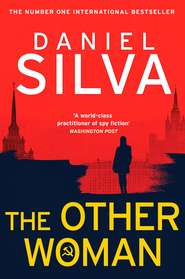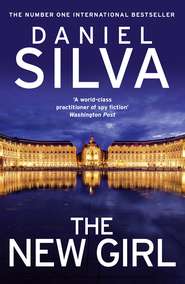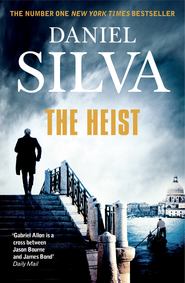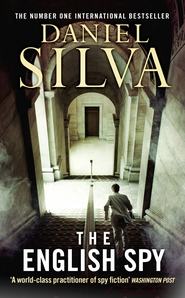По всем вопросам обращайтесь на: info@litportal.ru
(©) 2003-2024.
✖
Daniel Silva 2-Book Thriller Collection: Portrait of a Spy, The Fallen Angel
Настройки чтения
Размер шрифта
Высота строк
Поля
“Office doctrine forbids agents to read newspapers in cafés. It’s far too obvious.” He paused, then added, “I thought we trained you better than that, Sarah.”
“You did. But on occasion, I like to behave like a normal person. And a normal person sometimes finds it pleasurable to read a newspaper in a café on a sunny autumn morning.”
“With a Glock concealed at the small of her back.”
“Thanks to you, it’s my constant companion.”
Sarah gave a melancholy smile. The daughter of a wealthy Citibank executive, she had spent much of her childhood in Europe, where she had acquired a Continental education along with Continental languages and impeccable Continental manners. She had returned to America to attend Dartmouth, and later, after spending a year at the prestigious Courtauld Institute of Art in London, she became the youngest woman ever to earn a PhD in art history at Harvard.
But it was Sarah Bancroft’s love life, not her sterling education, that led her into the world of intelligence. While finishing her dissertation, she began dating a young lawyer named Ben Callahan who had the misfortune of boarding United Airlines Flight 175 on the morning of September 11, 2001. He managed to make one telephone call before the plane plunged into the South Tower of the World Trade Center. That call was to Sarah. With Adrian Carter’s blessing, and with the help of a lost van Gogh, Gabriel inserted her into the entourage of a Saudi billionaire named Zizi al-Bakari in a daring bid to find the terrorist mastermind lurking within it. At the conclusion of the operation, she had joined the CIA and was assigned to the Counterterrorism Center. Since then, she had maintained close contact with the Office and had worked with Gabriel and his team on numerous occasions. She had even taken an Office lover, an assassin and field operative named Mikhail Abramov. Judging by the absence of a ring on her finger, the relationship was proceeding at a slower pace than she had hoped.
“We’ve been on-again-off-again for a while,” she said, as if reading Gabriel’s thoughts.
“And at the moment?”
“Off,” she said. “Definitely off.”
“I told you not to become involved with a man who kills for his country.”
“You were right, Gabriel. You’re always right.”
“So what happened?”
“I’d rather not go into all the sordid details.”
“He told me he was in love with you.”
“He told me the same thing. Funny how that works.”
“Did he hurt you?”
“I don’t think I’m capable of being hurt any longer.” It took a moment for Sarah to smile. She wasn’t being honest; Gabriel could see that.
“Do you want me to have a word with him?”
“Heavens, no,” she said. “I’m more than capable of screwing up my life completely on my own.”
“He’s been through a couple of difficult operations, Sarah. The last one was—”
“He told me all about it,” she said. “I sometimes wish he hadn’t come out of the Alps alive.”
“You don’t mean that.”
“No,” she said grudgingly, “but it felt good to say it.”
“Maybe it’s for the better. You should find someone who doesn’t live on the other side of the world. Someone here in Washington.”
“And how should I respond when they ask me where I work?”
Gabriel said nothing.
“I’m not getting any younger, you know. I just turned—”
“Thirty-seven,” said Gabriel.
“Which means I’m rapidly approaching old-maid status,” Sarah said, frowning. “I suppose the best I can hope for at this point is a comfortable but passionless marriage to an older man of means. If I’m lucky, he’ll permit me to have a child or two, whom I’ll be forced to raise on my own because he’ll have no interest in them.”
“Surely it’s not as depressing as all that.”
She shrugged and sipped her coffee. “How are things between you and Chiara?”
“Perfect,” said Gabriel.
“I was afraid you were going to say that,” Sarah murmured archly.
“Sarah . . .”
“Don’t worry, Gabriel, I got over you a long time ago.”
A pair of middle-aged women entered the garden and sat at the opposite end. Sarah leaned forward in feigned intimacy and, in French, asked Gabriel what he was doing in town. He responded by tapping the front page of her newspaper.
“Since when is our soaring national debt a problem for Israeli intelligence?” she asked playfully.
Gabriel pointed toward the front-page story about the debate raging within the American intelligence community about the provenance of the three attacks in Europe.
“How did you get dragged into it?”
“Chiara and I decided to take a stroll through Covent Garden last Friday afternoon on our way to lunch.”
Sarah’s expression darkened. “So the reports about an unidentified man drawing a weapon a few seconds before the attack—”
“Are true,” said Gabriel. “I could have saved eighteen lives. Unfortunately, the British wouldn’t hear of it.”
“So who do you think was responsible?”
“You’re the terrorism expert, Sarah. You tell me.”
“It’s possible the attacks were masterminded by the old-line al-Qaeda leadership in Pakistan,” she said. “But in my opinion, we’re dealing with an entirely new network.”
“Led by whom?”
“Someone with the charisma of Bin Laden who could recruit his own operatives in Europe and call upon cells from other terror groups.”
“Any candidates?”
“Just one,” she said. “Rashid al-Husseini.”
“Why Paris?”











